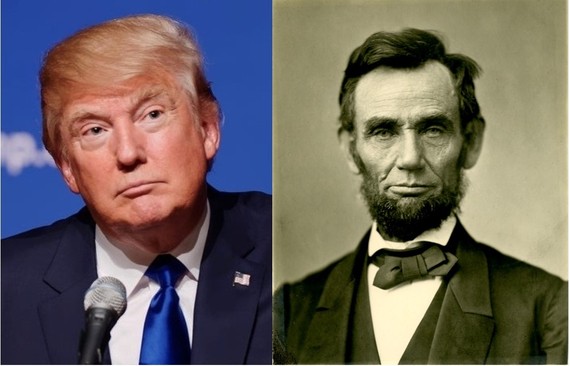Donald Trump's criticism of Judge Gonzalo P. Curiel is only the latest of his positions decried by the Republican Party establishment. They've opposed him throughout his campaign for his protectionist stance on trade, his immigration policies and his hostility towards the First Amendment, among other things.
All of this has been decried as "not conservative" and contrary to the party's principles. Ironically, the so-called "Party of Lincoln" doesn't recognize in Trump's platform all the basic elements of Lincoln's.
Americans tend to see history as a struggle between heroes and villains. Lincoln has been placed firmly in the hero category because of his widely misunderstood Emancipation Proclamation and for winning the Civil War. But when you get past the slavery issue, what's left of Lincoln's politics sounds a lot like Trump's. They didn't change significantly from the time of Lincoln's first political speech:
"Fellow-Citizens: I presume you all know who I am. I am humble Abraham Lincoln. I have been solicited by many friends to become a candidate for the Legislature. My politics are short and sweet, like the old woman's dance. I am in favor of a national bank. I am in favor of the internal improvement system, and a high protective tariff. These are my sentiments and political principles. If elected, I shall be thankful; if not it will be all the same."
Lincoln was then a member of the Whig Party and it was a coalition of former Whigs and abolitionists that formed the Republican Party in 1854. And while there is no reason to doubt Lincoln's personal opposition to slavery, it was Henry Clay's "American System," a repackaging of Alexander Hamilton's platform, that defined Lincoln's politics for most of his life.
Politically, the alliance with abolitionists allowed proponents of protectionism, internal improvements and a national bank to achieve the electoral success that had eluded them since 1800, when Jefferson's victory rang the death knell of the Federalist Party.
"Internal improvements" was the language of the time for what we now call "infrastructure." Prior to Lincoln's administration, most roads and other infrastructure were privately funded and built. Both the Federalists and the Whigs had lost elections for sixty years largely for promoting government infrastructure and high tariffs. With Lincoln's victory and the subsequent fifty-year dominance of the Republican Party, that trend completely reversed.
Lincoln ran on and executed his plans to subsidize railroads and other infrastructure. Trump wants to do likewise. Lincoln ran on and executed his plans to raise tariffs significantly in order to protect domestic manufacturers from foreign competition. Trump also wants to do likewise.
Trump has been criticized as dangerous to the First Amendment because of his continual attack on the press and threats to "open up our libel laws" as president and sue reporters who criticize him. Lincoln had him beat; he threw reporters in jail, just as the Federalists did under the Sedition Act during the 1790s.
While the issue of a central bank has been settled since 1913, it is noteworthy that Trump has lined up with libertarians in supporting an audit of the Federal Reserve. But he has given no indication he opposes its existence.
But what of Trump's most controversial position, to deport 11 million illegal aliens? Certainly, Lincoln never supported anything like that, right?
Wrong. Until the day he died, Lincoln supported and actively sought to execute a rather bizarre plan by today's standards, but widely supported at the time, called "colonization." Promoted since the early 18 century, the idea was to free the slaves and then subsidize their emigration to Liberia (created for expressly that purpose), the West Indies or South America. Colonization was yet another Whig Plank Lincoln inherited from his political idol, Henry Clay. In Lincoln's own words,
''I can hardly believe that the South and North can live in peace unless we get rid of the Negroes. Certainly they cannot, if we don't get rid of the Negroes whom we have armed and disciplined and who have fought with us, to the amount, I believe, of some 150,000 men. I believe that it would be better to export them all to some fertile country with a good climate, which they could have to themselves."
In fairness, Lincoln was a supporter of foreign immigrants, opposing the anti-immigrant Know Nothings. But on the charge of racism, Lincoln has far more to answer for than Trump. Trump has repeatedly separated his professed admiration for people of other races with his staunch opposition to illegal immigration. Lincoln made no bones about his view that black people were inferior.
The media and Republican Party leadership has characterized Trump's campaign as a departure from both the Republican Party's principles and conservatism itself. In reality, it's exactly the opposite. Trump's platform not only represents a return to the founding principles of the Republican Party, but to the long held positions of conservatives in the British-American tradition.
Laissez faire markets and open borders have always been positions traditional conservatives staunchly opposed as a threat to the order and stability their entire philosophy is centered around. The Republican Party was born advocating tariffs and higher government spending. It has never changed those policies in practice, despite free market rhetoric in recent decades.
Trump's success should come as no surprise. His economic ideas have had the support of truly conservative voters since the days of Alexander Hamilton. That's why it is a somewhat futile exercise to look for a "true Republican" or a "true conservative" who departs significantly from Trump and can win. Voters seeking free markets, small government and individual liberty should look to Gary Johnson and the Libertarian Party instead.

